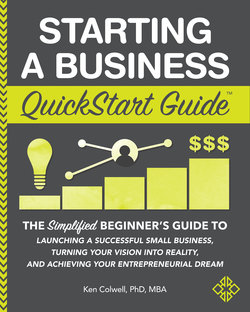Читать книгу Starting a Business QuickStart Guide - Ken Colwell PhD MBA - Страница 30
На сайте Литреса книга снята с продажи.
What If I Fail?
ОглавлениеA fear of failure is natural for many first-time entrepreneurs, but successful entrepreneurs think about failure in an entirely different way. To them, failure is not only a part of the process of starting and growing a new business, but it is also an important marker signifying growth and movement. Part of this perspective shift comes from the inherent optimism that all entrepreneurs share, but a mindset that embraces failure is a realistic and holistic look at what it means to find success starting your own business.
It doesn’t matter how many times you fail. It doesn’t matter how many times you almost get it right. No one is going to know or care about your failures, and neither should you. All you have to do is learn from them and those around you because all that matters in business is that you get it right once.
– MARK CUBAN
The best way to understand failure in the context of your own business is to operate under the assumption that you will fail. Failure in some capacity is guaranteed when entering uncharted territory. If failure is guaranteed, then that means the way you handle failure becomes the most important element of your entrepreneurial success. Pick any successful business today that started out as a startup. The founding team of that business met numerous failures, but today the business is alive and well. Where would that business be today if those founders had seen failure as a dead end?
Failure is an inevitability of the testing and experimentation process. For entrepreneurs who are starting out, a large portion of what they do is experimentation. If an entrepreneur doesn’t experiment with a new way of doing things, how can the business grow? In this way, failure is not a dead end, but an indicator that growth and learning are taking place.
The way in which a person views failure is a mindset, not a personality trait. Personality traits can be difficult to change, but you are in complete control over your own mindset. Don’t be paralyzed by a fear of what people will think. Failures are the learning tools through which we reach successes.
Within the entrepreneurial world, failure is the means by which businesses find their way. Harnessing this concept as a driver of innovation and growth can seem difficult at first, but it can be developed through key activities.
Change your mindsetWelcome failure as a learning opportunity, and try to fail fast so as to not waste time chasing a poor business model. The faster you can put inevitable failures behind you, the faster you will be along the path toward success.
Be ready to pivot rapidlyFailing just for the sake of failing won’t get you anywhere. When you reach the realization that the current course isn’t working, be ready to pivot. Understanding failure as a learning tool means that flexibility is important. Don’t cling to an original idea, especially in the face of evidence that it isn’t the best course of action. It’s better to “fail fast” than continue on a course that’s not working.
Experiment constantlyConstantly experiment with new ideas and initiatives but realize that many aren’t going to work out. Try to inject a healthy dose of natural curiosity about new ideas into the way you think about your business, and the good ones will morph into opportunities.
In practice, this set of activities changes the path to success from the straight line that many people envision to the branching and divergent path that is a more accurate representation of the journey to success that you will encounter. The twisting path pictured is a visual representation of the entrepreneurial mindset and its relationship to failure. In short, each point of failure along the way is an opportunity to pivot toward a new path to success.
